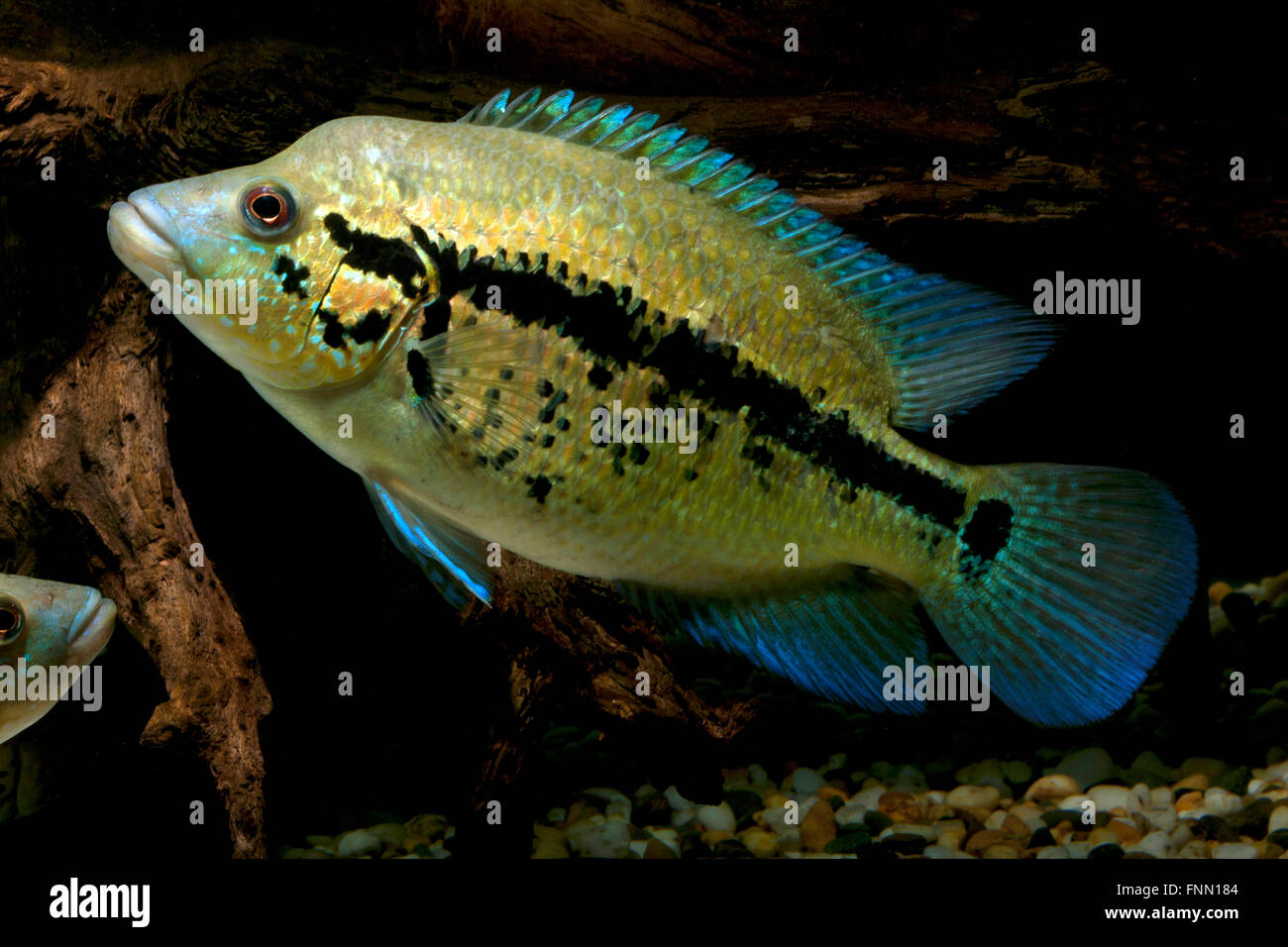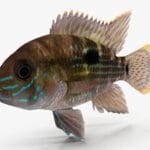Unveiling the Wolf Cichlid: Origins, Habitat, and Appearance
The Parachromis dovii, better known as the Wolf Cichlid, or sometimes “Guapote” or “Rainbow Bass,” hails from the Atlantic slope of eastern Central America. These impressive predators can reach lengths of up to 28 inches, demanding a significant commitment from their keepers. Before you consider bringing one home, understand that the Dovii isn’t a casual pet; it’s a responsibility that can span decades.
Natural Habitat
In the wild, Dovii inhabit slow-moving, murky waters of rivers and lagoons. They prefer areas with ample cover like fallen branches, submerged vegetation, and rocky crevices, which they utilize for both ambush hunting and territorial defense. This natural environment informs the type of tank setup they’ll thrive in.
Physical Characteristics
Dovii are a sight to behold. Their robust bodies are typically a muted olive-green or grey, but they can exhibit flashes of vibrant blue, green, and even red, especially during breeding displays or territorial disputes. Males are generally larger and more intensely colored than females, and often develop a prominent nuchal hump (a fatty deposit on their head) as they mature.
Dovii Kingdom: Tank Setup and Requirements
Given their impressive size and territorial nature, Dovii demand substantial living quarters. A minimum tank size of 125 gallons is absolutely essential for a single adult, with larger tanks (200+ gallons) highly recommended, especially if you’re considering tank mates. Remember, these fish need room to roam and establish their territories.
Filtration and Water Parameters
Powerful filtration is non-negotiable. Dovii are messy eaters, and maintaining pristine water quality is crucial for their health and well-being. Regular, large water changes are a must. Aim for a pH between 7.0 and 8.0, and maintain a consistent temperature between 75 and 81°F.
Substrate and Decor
Replicate their natural habitat with a substrate of sand or fine gravel. Rocks, caves, and driftwood are not mere decorations; they’re essential for providing hiding places and breaking up sightlines, which can help reduce aggression. These elements also offer opportunities for the Dovii to exhibit natural behaviors, enriching their captive environment.
Fueling the Predator: The Dovii Diet
The Dovii is a carnivore through and through. Forget flakes or vegetarian options; these fish crave protein. A high-quality diet is paramount, consisting of items like:
- Cichlid Pellets: Offer high-quality, protein-rich pellets designed specifically for carnivorous cichlids.
- Whole Fish: Offer small feeder fish occasionally, ensuring they’re properly quarantined to prevent the introduction of parasites or diseases.
- Shrimp and Krill: Excellent sources of protein and essential nutrients.
- Mussels and Earthworms: Provide variety and additional nutrients.
Avoid overfeeding. In their natural environment, Dovii are hunters, not grazers. Feeding them once a day or even every other day, depending on their size and activity level, is usually sufficient.
Temperament and Tank Mates: A Delicate Balance
Dovii are known for their aggressive and territorial nature. While not inherently “mean,” their instincts drive them to dominate their surroundings. Introducing tank mates is a high-risk endeavor, requiring careful planning, constant monitoring, and a hefty dose of realism.
Potential Tank Mates (with Cautions)
If you’re determined to try tank mates, consider only the largest and most robust fish, such as other large Central/South American cichlids, large catfish (like Plecos), or Peacock Bass. However, even these pairings are not guaranteed to be successful. Remember, every Dovii is an individual, and their tolerance levels vary. Be prepared to separate fish if necessary. [https://www.lolaapp.com/What fish can live with wolf cichlids? – parachromis dovii wolf cichlid]
A Solitary Existence?
Many experienced Dovii keepers advocate for keeping them in a species-only tank to avoid the potential for conflict and stress. This approach simplifies care and minimizes the risk of injury to tank mates. [https://www.lolaapp.com/Are Dovii cichlids aggressive? – parachromis dovii wolf cichlid]
Breeding Dovii: A Rewarding Challenge
Breeding Dovii can be a fascinating experience, but it’s not for the faint of heart. These fish are dedicated parents, fiercely guarding their eggs and fry.
Sexual Dimorphism and Breeding Triggers
Males typically develop a more pronounced nuchal hump and more intense coloration than females. Breeding can be triggered by mimicking seasonal changes in their natural environment, such as slightly raising the water temperature and increasing the frequency of water changes.
Parental Care
Dovii are open substrate spawners, typically laying their eggs on flat surfaces like rocks or driftwood. Both parents actively protect their offspring, exhibiting impressive parental care. Be prepared for increased aggression during this period.
Dovii Health: Proactive Care is Key
Dovii are susceptible to the same diseases as other fish, including Ich, Fin Rot, bacterial infections, and parasites. Quarantine any new arrivals religiously. Maintaining pristine water quality is paramount for preventing disease. Consult with an aquatic veterinarian for diagnosis and treatment options.
Early Detection
Regularly observe your Dovii for any signs of illness, such as lethargy, loss of appetite, unusual markings, or difficulty breathing. Early detection is key to successful treatment.
The Long Haul: Lifelong Commitment and Ethical Considerations
Owning a Dovii is a long-term commitment. These fish can live for over a decade, sometimes reaching 24 to 30 years or more in captivity. [https://www.lolaapp.com/What is the lifespan of a Dovii fish? – parachromis dovii wolf cichlid] Before acquiring one, consider:
- Long-Term Care: Are you prepared to provide consistent, high-quality care for many years?
- Rehoming Options: Have a plan in place, just in case unforeseen circumstances prevent you from continuing care.
- Ethical Implications: Dovii are demanding creatures. Are you fully prepared to meet their needs and provide an enriching environment?
Responsible Dovii ownership requires research, dedication, and a genuine commitment to their well-being. Avoid impulse buys. Consider the Dovii’s needs above your own desires. Only then can you truly appreciate the majesty and magnificence of this impressive predator.
For a different kind of challenge, perhaps on land, check out the NZ Huntaway dog. Their herding prowess might pique your interest.
- Unveiling the Enigma: Mansoureh Khojasteh Bagherzadeh’s Public Appearances & Private Life in Iran - July 18, 2025
- Unveiling the Mystery: Mansoureh Khojasteh Bagherzadeh’s Husband: A Rare Glimpse into a Private Life - July 18, 2025
- Unveiling Masoud Khamenei’s Mother: Power, Influence, and Iran’s Future - July 18, 2025

















1 thought on “Parachromis Dovii (Wolf Cichlid): A Comprehensive Guide to Care, Tank Setup, and Compatibility”
Comments are closed.